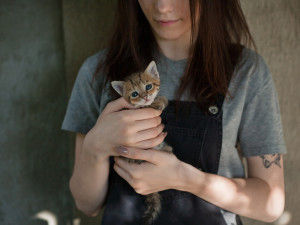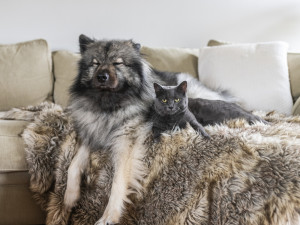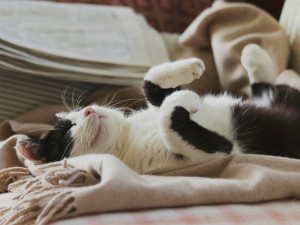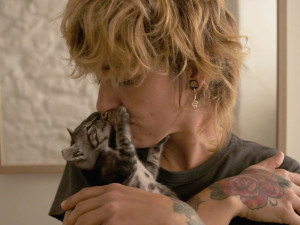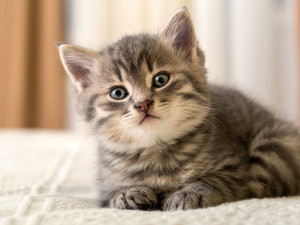Cats Aren’t Loners, After All
Cat behaviorist Kristiina Wilson on the importance of socializing cats.
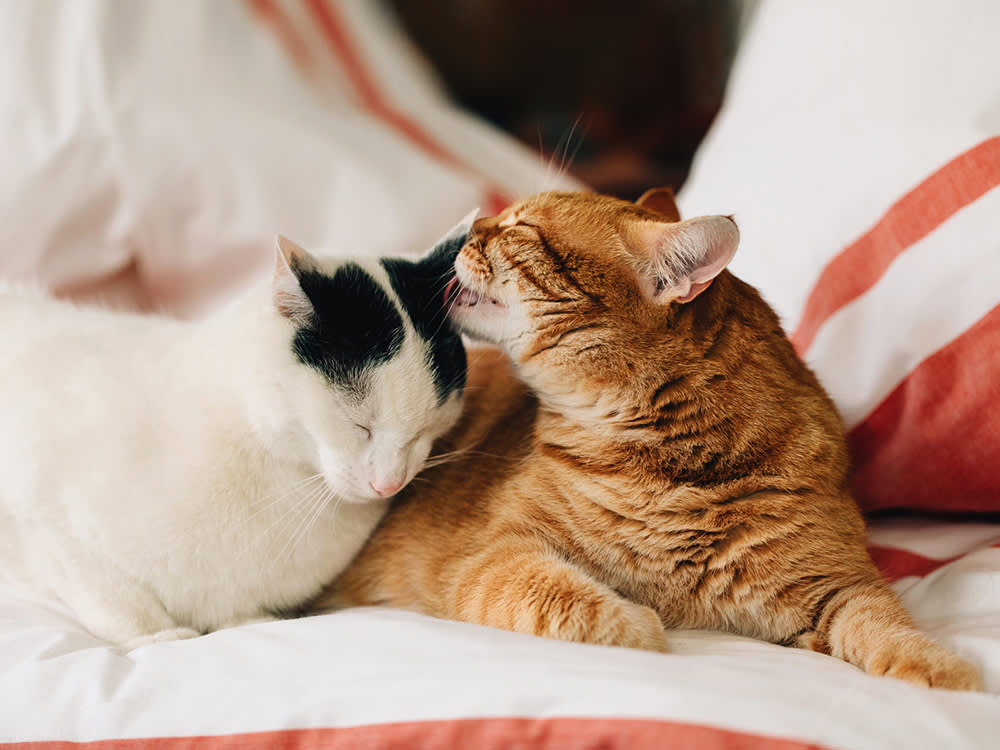
Share Article
Cats have long been stereotyped as solo creatures. When compared to dogs, they’re considered aloof — unless they’re being described by people with cats, who’d probably choose the word discerning. Whichever way you want to look at it, the culture has determined that cats are less eager to hang than their domesticated canine counterparts.
But that doesn’t mean they’re completely antisocial. In fact, the idea that cats are inherently aloof is a bit of a myth. Like dogs, cats require socialization in order to live happy and healthy lives. Painting cats as loners is likely doing them more harm than good. We talked to cat behaviorist Kristiina Wilson about how everyone, felines included, needs a friend.
Kittens have a peak socialization period.
According to cat behaviorist Kristiina Wilson, kittens need to be socialized with both cats and humans at a very early age. “It’s really important for cats to be around their siblings or their mother until they’re about two months old,” she says. “They need to learn certain communication signals from each other.” Her own cat, for example, doesn’t know that hissing usually means aggression, so she’ll hiss when she isn’t upset.
Wilson adds that if cats aren’t socialized while young, it can lead to single kitten syndrome, which causes a set of behavioral problems that can be hard to deal with, including biting and excessive dependence.
They also need to spend time around people so they aren’t fearful in the future. A kitten’s peak sensitivity period of socialization is from two to eight weeks of age. “That’s when it’s really important to get them around people, get them around vacuums, all the stuff that goes along with being part of a human household,” Wilson says. “That’s how you get a cat who’s very social.”
She points to another of her cats, Steve, as an example. Steve had a lot of siblings and grew up in Wilson’s busy photograph studio. Because he was meeting new people every day during this socialization period, he’s now “the most social guy in the world.” (If you don’t believe us, watch him speak with buttonsopens in new tab.)
Cats need companionship.
As for adult cats, Wilson recommends continued socialization. “I think all of us need friends who are of the same species. It’s very rare when you hear about people who live completely alone in the forest, and I think we’re always like, ‘Oh, that must be hard for them,’ right? And we set our animal companions up for that exact same experience, where they’re just living alone in their homes with no one of the same species,” Wilson says.
“When I adopt out animals, I always make people take at least two kittens or cats unless they have an animal already at home, just because I think animals need friends.”
That said, Wilson acknowledges that some cats are antisocial, the same way some humans simply prefer to be alone. Whether or not a cat needs a friend should be considered on a case by case basis. If your cat happens to be a loner, that’s okay, too. Just be sure you’re providing them with tons of enrichment so they don’t get bored or depressed.
It’s never too late.
Even when the socialization period has passed, it’s possible to help a cat adjust to living with other cats. But whenever two cats are introduced, the process should be done slowly — and that goes tenfold for a cat who had a companionless kittenhood.
“The ideal thing about hitting that socialization window is that’s when kittens are primed to learn things and not necessarily to be afraid,” Wilson says. “So it’ll take a lot longer and you’ll have to be a lot more patient with an older cat, but it certainly can be accomplished.”

Sio Hornbuckle
Sio Hornbuckle is a writer living in New York City with their cat, Toni Collette.
Related articles
![A dog and cat sitting next to eachother on a fur blanket on a couch]()
The Pros & Cons of Adding a Second Pet to the Fam
Double the trouble or double the fun? Dog trainer Lindsay Hamrick weighs in.
![Black and White cat with its eyes closed laying on its back on a scarf]()
Is My Cat Happy?
In this excerpt from her new book, Purr: The Science of Making Your Cat Happy, animal behaviorist Zazie Todd shares science-backed insights into our cats’ moods.
![Blonde woman with hand tattoo kissing her gray kitten]()
A Step-by-Step Guide to Adopting a Cat
From where to begin looking to what the adoption process entails to how to prepare your home for your new pet.
![Kitten sitting on a blanket]()
7 Steps to Keep Your New Kitten Happy and Healthy
With great cuteness comes great responsibility. A vet breaks down everything you need to know when you bring home a new kitten.

